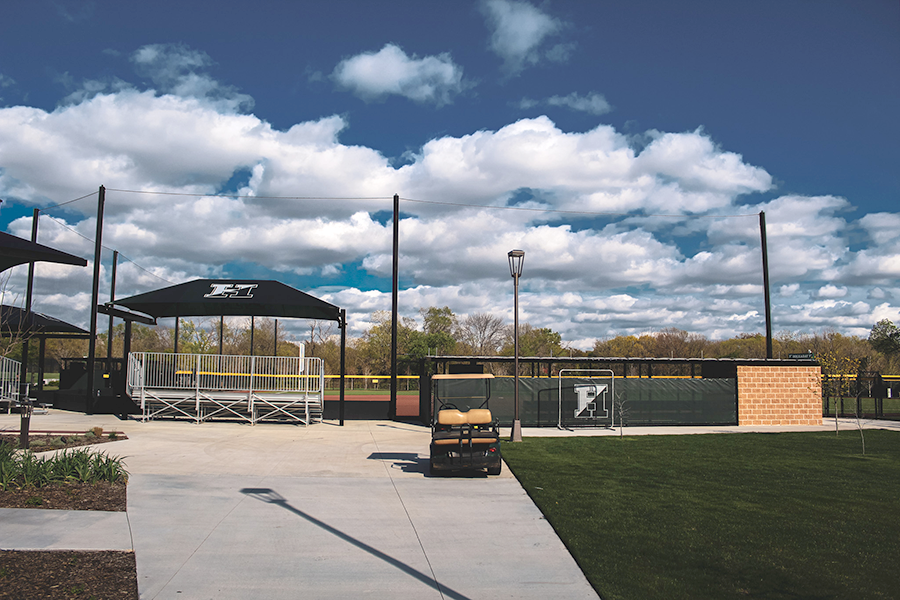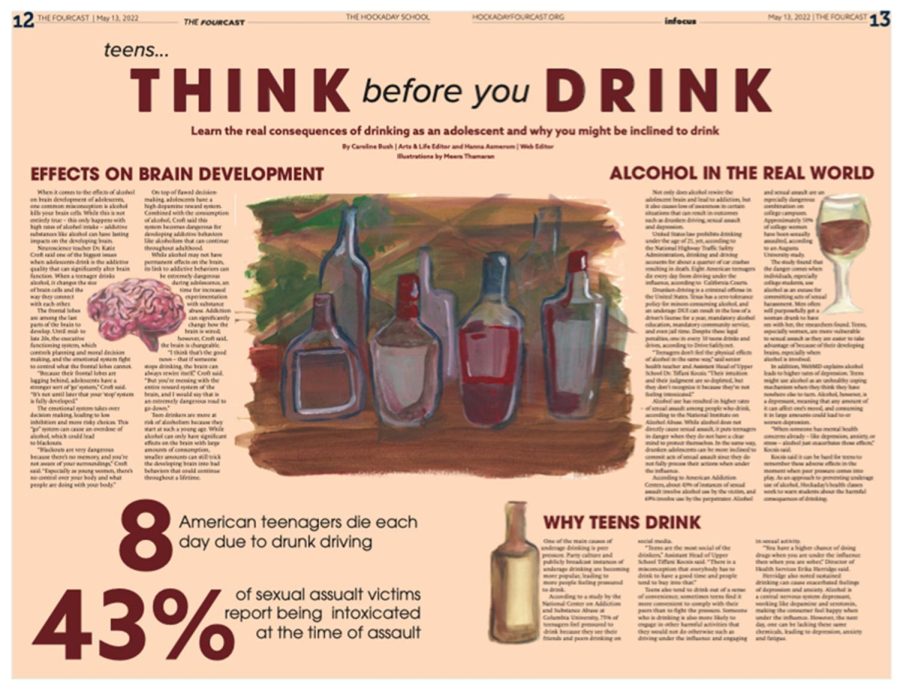Nestled between the Trinity River and the C. F. Hawn Freeway is the South Dallas neighborhood of Bonton. The landscape is sparse, with few buildings besides the houses themselves. The nearest grocery store is a three-hour round trip from Bonton, and churches outnumber the only food stores – liquor stores and “supermarkets” – in Bonton. These shoddy structures sell only cheap, processed and unhealthy foods, but Bonton residents have no other option to ll their stomachs. Children and adults alike eat starchy chips, fatty snack cakes and sugary sodas for sustenance, and residents of Bonton have lived this way for close to 50 years.
FACING REALITY
Bonton is just one of 40 food deserts in Dallas County. In 2014, according to Feeding America, there were 473,680 people considered to be food insecure in Dallas County alone, which makes up 19.3 percent of the population. To put this in perspective, the rate of food insecurity in Texas in 2014 summed up to 17 percent, and that of the United States was 15.4 percent. In other words, Dallas County’s population contains a higher percentage of households who often cannot put healthy food, or any food at all, on their family’s table than both the state of Texas and the United States as a whole.
This rampant lack of nutritious food and reliance on cheap, unhealthy and processed snacks results in more than grumbling stomachs; food insecurity has major health implications on communities around Dallas. Patrick Wright, a resident of Bonton, is aware of the illnesses that these limited food options can cause. “By not having proper food, or fresh, healthy food, available, you can be in your early 30s and be suffering from high blood pressure, or you may have diabetes,” Wright said.
In fact, the rates of cancer, heart disease, diabetes and stroke in Bonton are double those of the city of Dallas, according to the Bonton Farms website. Men in Bonton also live an average of 11 years less than the residents of Dallas County as a whole. Wright’s own family has fallen victim to these dire circumstances.
“I’ve lost a couple of uncles who had diabetes, and my dad, I lost him to cancer,” Wright said.
Food insecurity can be the result of a multitude of factors. Besides living in a food desert, one can be subject to food insecurity due to low, static earnings or unemployment. Liana Solis, a Communications Associate from the North Texas Food Bank, understands that those affected by food insecurity often are unable to control their income.
“A lot of people just assume that our clients just come to the program because they’re lazy, or something of that sort,” Solis said. “But a lot of our clients are children or disabled or elderly, and so they cannot earn their own means to get food.”
Laura Day, Hockaday’s Community Service Director, is trying to make the Hockaday community more aware about this widespread issue. At her Hockaday summer camps, she plans to spend time exploring the issue of Dallas food insecurity. From June 24 to June 30, and again from July 17 to July 21, Day will take Middle School campers on day trips around Dallas, visiting non-profits and learning about social issues that plague Dallas. For Upper School students who sign up for the program, Day is offering two single day trips on June 21 and July 12. Both summer experiences will spend time discussing food insecurity around Dallas. Day believes that awareness is vital in fighting food insecurity.
“I’m educating people as much as I can about food insecurity,” she said.
https://hockadayfourcast.org/in-focus-episode-7-out-of-reach/
CLAIMING THE MOST VULNERABLE VICTIMS
According to the North Texas Food Bank, one in four children in Texas are food insecure, and this trend is apparent in the Dallas Independent School District.
At Thomas C. Marsh Preparatory Academy, a middle school located just two miles from Hockaday, 85 percent, or 824 out of 970, of the students are considered economically disadvantaged and depend on the school cafeteria for two meals per day. The school’s instructional coach, Jill Allison, can see this high rate of food insecurity affecting her students’ academic life. “Those kids who come to school with any sort of hunger are definitely distracted. They can’t focus and it could turn into behavior problems or lethargy,” Allison said.
The same issue exists at Tom C. Gooch Elementary. A vast majority of the students, around 91 percent, are considered economically disadvantaged, and they too rely heavily on the free breakfast and lunch meals provided by the school district. Like Allison, Kim Ashmore, the principal of Gooch Elementary, notices the effects of hunger and food insecurity among her students. “In academics, they lack the energy and ability to stay focused and active and engaged in the classroom,” Ashmore said.
In the private school bubble, holiday and summer breaks from school connote fun, friends and most importantly, freedom from stress. For underprivileged kids, however, like those whom Hockaday students tutor during the school year, breaks are often taxing times due to food insecurity. Because so many DISD students rely on school for two or more meals a day and are still hungry during the school year, the lack of food over the breaks is especially devastating.
Chair of the Community Service Board and junior Shreya Gunukula started a kids summer camp at T.R. Hoover Community Development Center in June of 2016, and running the camp has allowed her to see the impact of food insecurity on this community over the summer.“I see food insecurity in the struggle when we have to find lunch for the kids every day in the summer,” she said.
In order to ease this difficulty, Marsh Preparatory Academy provides turkeys, hams and some full meals to low income families over its Thanksgiving and Christmas breaks. The school district also ensures that there is at least one school in each feeder system, or community of nearby schools, that will serve breakfast and lunch during the long breaks, like summer vacation.
Ashmore, too, is aware of the larger issue of summer meals for food insecure students and their families. “When they go home in the summer, and they are there all day long and they don’t have breakfast and lunch, it puts an extreme burden on the parents who are already financially strapped,” Ashmore said.
Per Ashmore’s request, Gooch Elementary will once again be a meal site this summer. Any child under the age of 18, no matter if they are a DISD student or not, will be able to come to the school to receive a free breakfast and lunch.
Along with district sponsored programs to keep students fed while they are at home, the North Texas Food Bank has implemented several programs designed to ease the stress of food insecurity for children. The most well known of these is the Food for Kids program, which supplies free and reduced lunches that many elementary schools rely on. This initiative provides meals for 12,000 kids per week in 10 counties and 365 schools. Additionally, the backpack program gives students a backpack full of food at the end of each week, ensuring that children will have food to eat over the weekends. The backpacks, however, are not available to every DISD school, and many remain on a waitlist. The School Pantry system also provides food for food insecure children and their families. Every two weeks, students and families can come to their school and pick up 30 pounds of food from the NTFB.
Solis realizes the gravity of the issue of food insecurity on young people. “Especially in children when you don’t know where your next meal is coming from, it can be a scary thought when you’re still growing,” she said.
Bonton Farms, a pioneer in urban farming, is also looking to aid food insecurity, especially with children. Mathew “Trog” Trogdon, the vice president of Bonton Enterprises, sees the importance of both providing food for children and showing them where it comes from. “We’re working to develop a formal kids program where we can feed them and also educate them about agriculture,” he said.
ON THE FRONT LINES
Besides their programs specified to feed children, the NTFB also works to provide food for adults and the elderly. A majority of the food donated to the food bank is then sourced to their over 200 partner agencies, many of which are food pantries, churches and soup kitchens. The rest of the food is designated for children’s programs and senior programs.
The NTFB runs a food delivery system for seniors who are unable to leave their homes easily and buy food for themselves. Their All Community Pantry is a food pantry run by the food bank itself, and adults are able to come to the pantry and pick up food.
Even with the significant work they do to fight food insecurity—the NTFB provided 70 million meals in the last fiscal year—the problem of food insecurity is vast. The need in North Texas is 92 million meals, and the food bank aims to provide this immense amount of food by 2025. When this feat seems too daunting, Solis says that she and her colleagues need only to remember the significance of what they are working for. “Even if one of us is having a bad day that day, all we have to do is remember what we’re doing it for and remember the children and the seniors and the families that need our help,” she said.
Another response to the food insecurity that plagues Dallas has been the rise of urban farming in the areas that need fresh, healthy food. Urban farms are relatively small yet fully functioning farms popping up in city areas of Dallas, and they seek to provide fresh produce to their local communities.
Paul Quinn College, located in the low-income Highland Hills neighborhood, is home to a verdant farm that supplies food to its surrounding community. Not only is Highland Hills a low income community, but the nearest grocery store is located two and a half miles away. While this distance is minimal if traveled by car, two and half miles is about a three hour round trip to the grocery store and back by public bus. Like Bonton, the rates of diseases such as diabetes, heart disease and obesity are increased in Highland Hills due to the lack of nutritious food.
After the school ended their football program in 2007 due to financial concerns, the field remained vacant for three years, until private donors transformed it into a farm. The We Over Me Farm currently provides fresh and nutritious food for the community, but, as Farm Manager James Hunter explained, many residents are unfamiliar with this produce, and thus the farm aims to provide culinary education so that the community can cook balanced meals.
“We’re currently exploring options to create mobile food delivery systems and nutrition and healthy eating programming in order to really take a holistic stance at approaching the issues surrounding food insecurity,” Hunter said.
The We Over Me Farm benefits not only the surrounding community by providing healthy food but also by easing the financial burdens of their students. Through the Paul Quinn College’s work program, students can work on the farm for 150 hours per semester and receive a $2500 discount on their tuition. In a neighborhood where food is often a luxury, this reduction can go a long way.
Bonton Farms in the Bonton neighborhood of South Dallas was also founded to provide fresh food to a community in need. With the nearest grocery store three miles away and just three liquor stores and a hair salon as grocery shopping options, Bonton is one of Dallas’ 40 food deserts. In 2012, Founder and Executive Daron Babcock moved from Frisco to Bonton. He began a Bible study in the neighborhood and tried to help the community members by finding them jobs, but this only revealed a larger issue.
“Daron would send people out on jobs and everyone failed due to some medical situation,” Wright said. Babcock quickly realized that Bonton residents were sick and dying from a lack of nutrition in their diets. In response to this long-standing obstacle, he began a vegetable garden on the vacant lot next to his house. Babcock caught the attention of the city government and Habitat for Humanity and acquired more land, and Bonton Farms was officially established.
The farm currently sells its produce, honey, eggs and goat’s milk to both the community members and to Dallas restaurants, such as Café Momentum. Trogdon sees significant expansion in the farm’s future, especially in the establishment of a market in which they can sell the food. “We want to be the first market of 40 markets, one in each food desert. And not only that, we want it to be owned and run by somebody in the community, so we want to develop entrepreneurs,” Trogdon said.
Even without the market, Bonton also provides jobs to its community members. Through their discipleship program, Bonton residents can work up through the ranks and earn a salary.
Because Bonton Farms was a pioneer in urban farming in Dallas, many look to Babcock’s institution for inspiration and guidance in planting their own urban farms. Wright, who works at the farm, sees Bonton Farms as the model for all other urban farms in Dallas. “The City of Dallas has labeled us as the pioneers of urban farming, meaning we set the standards and raised the bar,” Wright said. “If you want to urban farm, you’re going to have to be modeled after Bonton Farms.”
In fact, Gunukula hopes to start an urban farm on the vacant lot next to T.R. Hoover Community Development Center, and she is looking to accomplish the same goals as Bonton Farms. “We thought not only would [a farm] be a great addition to the community, but it could provide fresh food and vegetables to the kids,” she said.
Hockaday alumna Meghan Tabor ’12, grant writer and volunteer coordinator at Bonton Farms, believes in the power of this private group and others like it in fighting food insecurity in Dallas. “There have been a lot of barriers put up by the government, so I think that non profit groups are going to have to spearhead the effort,” Tabor said.
PATRICK: FROM HUNGRY TO HELPING
Patrick Wright, farm manager and director of sales at Bonton Farms, is living proof of the positive effects of groups working to fight food insecurity. Although now he is surrounded by fresh produce every day, Wright, growing up in Bonton, struggled with food insecurity and depended on liquor stores for sustenance. “I remember for 25 cents I could buy a honey bun, if I hustle up 25 more cents I could get a bag of chips, and if I get another 25 cents, I could get a soda,” Wright said. “And that’s a meal right there and that’s how we ate for years.”
Having experienced food insecurity himself, Wright sees the effects of living in a food desert on the children of his community. “The effect of the food desert situation on a child growing up, it can be devastating. It could really endanger a child’s health,” he said.
When Daron Babcock moved to Bonton, Wright was 46, was suffering from a drug addiction and had recently lost his job and his home. “I had accepted my fate that I was a failure. That says one thing about growing up in the hood; you don’t have a lot of options. It’s like one generation misleads the next generation,” Wright said.
Wright and Babcock were brought together by coincidence, as Babcock was looking for a home with electricity and Wright’s uncle’s home, where he was staying, had electricity. The men began to talk, and Babcock asked Wright to come to his Bible study and begin working at his garden. At this time, Bonton Farms had not yet started.
Wright continued to work at the garden, and when Habitat for Humanity gave Babcock two more empty lots to plant on, Wright helped construct the farm that is there today. Now, Wright is an instrumental part of the farm and gets to see the children in the community learn about agriculture and eat the nutritious food that he lacked in his youth. The farm also provides a beneficial place for kids to come to in their free time.
“This is a safe haven, a place where kids can come and learn. They don’t have to be hanging out at the store with the drug dealers, they can come here and learn something,” he said.
To Wright, Bonton Farms has fulfilled and continues its mission to “Restore lives, create jobs and ignite hope.” Bonton Farms has not only inspired the community to come out and pick fresh food right from the plants, but it creates employment opportunities for those who need it the most.
“This neighborhood used to be one of the most despised, rejected, hated, feared communities out of all in Dallas. By this farm coming here it’s restoring people’s lives like it restored my life,” he said. “It gave me a purpose and a meaning in life and a lot of people find peace and tranquility when they come down here.”
Ali Hurst – Copy Editor




















